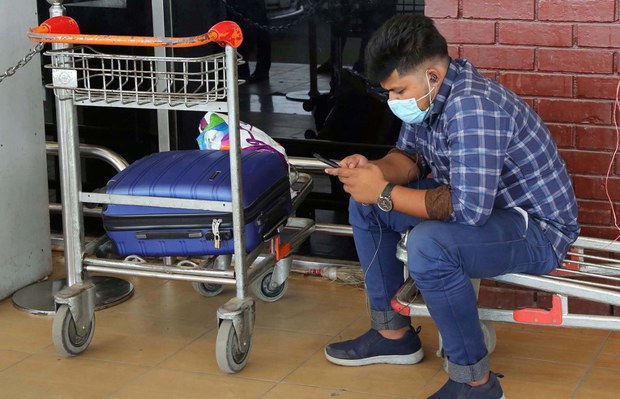Bangladesh Says it is Buying Mobile-Phone Interceptor to Boost National Security
2021.06.10
Dhaka
 A man uses his mobile phone at the Hazrat Shahjalal International Airport in Dhaka. 11, April 2020.
A man uses his mobile phone at the Hazrat Shahjalal International Airport in Dhaka. 11, April 2020.
Bangladesh’s cabinet approved the purchase of a U.S. $8 million device to listen in on mobile-phone conversations and read text messages, officials said this week, touting it as needed for national security although activists warn it could violate people’s privacy.
The South Asian nation’s government is buying the so-called mobile interceptor from a Swiss company called Toru Group Limited, said Md. Harun-Or-Rashif Biswas, a home ministry official.
“The purpose of procuring this vehicle-mounted mobile interceptor is to enhance the capacity of the NTMC,” Biswas, an additional secretary in-charge of police and the National Telecommunication Monitoring Center, told BenarNews.
“This device would enable law enforcers to deter crimes.”
The NTMC is a government agency whose mission is spelled out in English on its website – “To provide lawful communication interception facilities to the empowered agencies and to assist [the] appropriate authorit[ies] with communication intelligence as ordered by the Government of the People’s Republic of Bangladesh.”
Bangladesh bought a similar interceptor in 2017, a year after pro-Islamic State militants massacred hostages during an overnight siege at the Holey Artisan Bakery, a Dhaka café, in the nation’s deadliest terrorist attack to date.
At the time, the government said it would use the device to identify and track militants.
Biswas, the home ministry official, declined to elaborate on how exactly the NTMC would use the new device.
“This is rubbish,” he said when asked about activists’ worries that citizens’ rights could be breached.
“The main purpose of purchasing this device is to ensure national security. This is not for any malicious purposes.”
Article 96(1) of the Bangladesh's Telecommunications Act states: “The Government may in [the] public interest take over possession of a radio apparatus or the place where it is used, any telecommunication system, and all arrangements that are necessary for operating them, continue such possession for any period and keep the operator and his employees engaged on full-time or for a particular time for the purpose of operating such apparatus or system.”
BenarNews tried to confirm details about the technology purchase with the company said to be supplying it, the Toru Group, but found only one company by that name online.
The website described the Toru Group as “a world leading provider of Cyber Security solutions,” but contained no links, contact information or other information about the firm, such as where it is based.
BenarNews asked Biswas about this, and to provide contact information for Toru Group, but he declined to do so.
“The content of the website of the company is not our concern,” Biswas told BenarNews.
Lawyer: ‘There is no legal basis’
Rights activists, meanwhile, worry that the mobile interceptor’s use could violate citizens’ constitutional right to privacy, and that the technology could be used to spy on the opposition and ordinary citizens.
BenarNews asked a lawyer about whether the government could eavesdrop on citizens’ phone conversations if national security was at stake.
He said “no.”
“There is no legal basis for law enforcers or other agencies to record the telephonic conversions of individuals,” Jyotirmoy Barua, a human rights lawyer, told BenarNews.
“For investigation of a crime, the Telecommunication Act 2001 allows investigators to seek information on selected clients from [telecom] service providers. But it in no way allows them to record conversations of citizens.”
However, there is no stated policy about the extent to which NTMC is allowed to monitor mobile phones and similar devices, the lawyer said.
“We have yet to frame a law on private data protection,” Barua said.
However, he believes the mobile interceptor would indeed compromise citizens’ right to privacy.
An information and communication technology expert explained how a vehicle mounted mobile interceptor normally works.
Tanvir Hassan Zoha said the device could be transported to different places.
“The interceptor takes control of all the mobile phone towers of the area where it is placed,” Zoha told BenarNews.
“By controlling the towers, this device can access all conversations, messages, photos and videos [on mobile phones]. This device can even track conversations, messages, photos and videos exchanged via WhatsApp, Viber and other social networking apps.”
As it is, international rights groups have criticized the Bangladesh government for being intolerant toward criticism and using a draconian law, the Digital Security Act, to clamp down on dissent.
A civil society leader said the mobile interceptor would facilitate such behavior.
“It would be used to suppress political and other opponents. The government is violating people’s privacy by procuring tracking devices with public money,” Badiul Alam Majumdar told BenarNews.
“This is really regrettable – this is not acceptable.”







